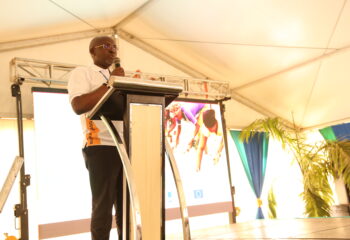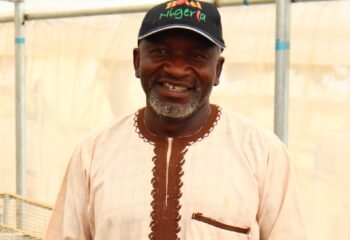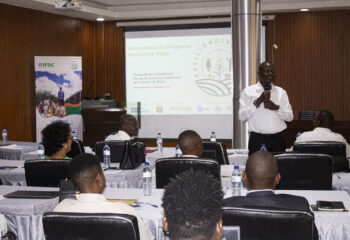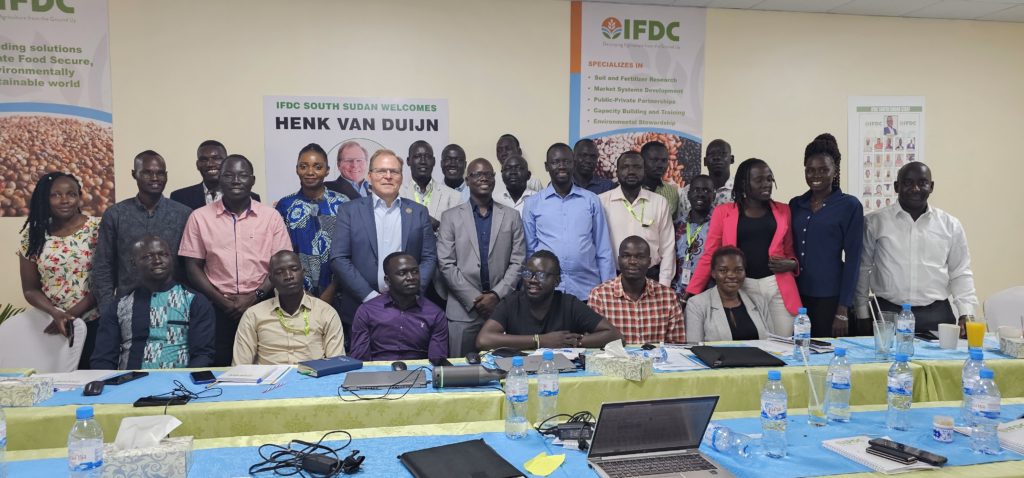
The President and CEO of the International Fertilizer Development Center (IFDC), Henk van Duijn, visited South Sudan as part of his promise to visit all 25 IFDC countries when he takes office in January 2023. South Sudan became the 6th country after Ethiopia and 4 countries in the North and West Africa region.
Upon arrival at the IFDC office in Juba, Henk was greeted by jubilant IFDC colleagues and local South Sudanese media. In his message to the media, the President first thanked the South Sudan team for the smooth facilitation of his visit to South Sudan and the warm welcome. He stated that South Sudan is IFDC’s fastest growing program and that the idea for IFDC to return to South Sudan was conceived during a visit to the country in early 2019. The objective was to develop a seed systems program that would consolidate the Seed for Development (S4D) project implemented by IFDC and funded by USAID from 2011 to 2015. The S4D program, which revitalized local seed production, focused on community-led systems and investment in local enterprises.
“In 2019, it was clear that seed was still a big gap in South Sudan’s agricultural sector, so A3-SEED was conceived,” Henk explained. “Until May 2021, there was no IFDC program, office, or staff in South Sudan. Today, I have come to South Sudan and am amazed to see a rapidly growing team of highly motivated young professionals with diverse skills. Not only have the numbers increased, but the name of IFDC has clearly become popular in the last two years. This is incredible work by the current pioneer team.”
When asked by the local media about the purpose of his visit to South Sudan, the CEO explained that his visit was to ensure that he had the opportunity to discuss the potential for further growth of IFDC’s South Sudan program.
“We need to invest more in local initiatives. Local businesses play a key role in ensuring that the poor are part of the local economy. By investing in local agribusiness entrepreneurs, we empower smallholder farmers. Agricultural production and productivity will increase, as will innovation. IFDC believes that by investing in the local agricultural sector, farmers will be motivated to protect their soils and the environment. Local communities need to see incentives for soil conservation and environmental protection. We need to bring these ideas to the table of the donor community for discussion and investment,” said Henk.
The Country Director of IFDC in South Sudan, Justin Miteng, expressed his gratitude for the high level delegation of IFDC management visiting South Sudan. He congratulated the President and CEO for winning the trust of the IFDC Board and for his nomination to lead IFDC.
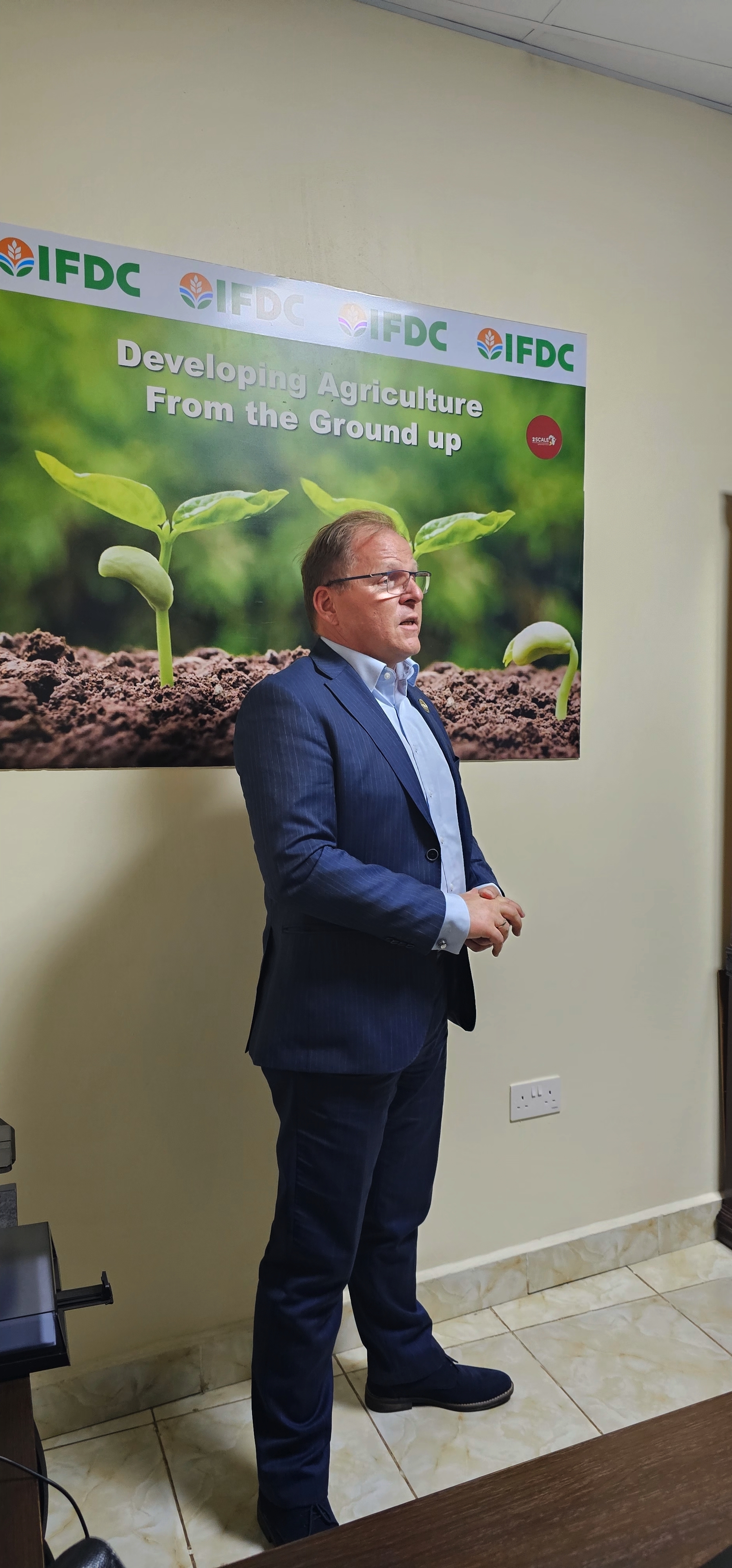
“This visit is an energizer for me and my team; and I am confident that the ripple effect of this visit will lead to the growth of IFDC in South Sudan. We have grown from no office and no staff in January 2021 to a full-fledged office with over 27 professional staff managing 3 projects across South Sudan,” Miteng explained. “Most importantly, we love the innovation in our projects and the way our work makes us think alongside our communities and the private sector to create sustainable impact.”
While in Juba, the President met with USAID South Sudan Mission Director Kate Crawford, who was accompanied by Deputy Mission Director Jeremiah Carew and Acting Deputy Director for Economic Growth Severio Duku at the USAID offices in Juba. In this meeting, the President explained IFDC’s mission and strategy and provided a historical background of IFDC from 1974 to the present. He illustrated IFDC’s work in investing in local enterprises and creating local economic development by showcasing the work of 2SCALE, A3-SEED and Resilience through Agriculture in South Sudan (RASS), where IFDC co-invests with local enterprises and builds their capacity to engage smallholder farmers in the development of their businesses. He stated that these three projects are progressive in nature and especially for A3-SEED, it challenges the narrative that farmers do not have the capacity to procure seeds and therefore seeds always have to be imported and distributed for free in South Sudan. He offered to work with the South Sudan team to develop innovative ideas on investing with communities to share with the USAID delegation to initiate discussions for future programming and to add them as innovative ingredients to the RASS project that we have already funded through USAID and IFDC as part of the implementing team.
During the official meeting at the Embassy of the Kingdom of the Netherlands in Juba, Her Excellency Ambassador Therese Marjan Schippers welcomed the President and CEO of IFDC at the Embassy. The meeting was cordial and characterized by discussions on the South Sudanese context and the established donor community. The two also briefly discussed the worrying political situation in Sudan and how it might affect South Sudan’s economy.
With regard to IFDC, Henk appreciated the investment that the Embassy has made in seed systems development and that IFDC is pleased with the progress of A3-SEED so far and hoped that the same satisfaction would be felt at the Embassy. Henk took the opportunity to urge the Embassy to continue to champion innovative programming and to think with the people they serve to get sustainable ideas on how their future investments can serve citizens effectively and sustainably. To make his point about the need for business investment at the local level, Henk used the case of the 10 seed companies and more than 35 agro-dealers supported by A3-SEED that have demonstrated the power of local entrepreneurship in production and distribution. He also used the story of 2SCALE, which has shown that investing in private sector innovation can enable farmers to benefit from local investments in value addition. The typical example was well demonstrated by Kanybek in Juba, two cooperatives in Yambio, and farmer group enterprises supported by RASS, which used the power of community mobilization and group enterprises to guide local entrepreneurship. According to Henk, these projects illustrate how investing at scale at the local level can bring about meaningful changes in attitudes and the transformation needed for local economic development. He urged the donor community to start looking at investing in larger, multi-year programs that are consistent transformative actions to communities other than investing billions in humanitarian aid that run for over dictates. IFDC is ready to think along these ideas in South Sudan, but also globally with like-minded development organizations to develop such programs.
A similar discussion was held with the country representative of the Food and Agriculture Organization of the United Nations, Mr. Meshack Oguna Malo, who expressed his organization’s interest in supporting a specialized soil analysis and mapping service in collaboration with IFDC. Mr. Meshack explained that FAO is ready to work with IFDC to develop a digital voucher system to ensure that all locally produced seeds in South Sudan reach the farmers.
Among the government dignitaries were the South Sudan Chamber of Commerce and Industry. The Chamber of Commerce was pleased to learn about IFDC’s work in private sector development and urged IFDC to work with them to develop agricultural investment in the country.
Henk’s visit to South Sudan coincided with the launch of a new product by a private sector supported by 2SCALE in South Sudan where he officiated the launch of the product together with several South Sudanese stakeholders including government, private sector (banks) and other international organizations. The visit also coincided with the celebration of the Dutch King’s Day.

